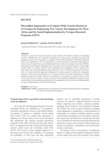Diversified Approaches to Evaluate Wide Genetic Resources of Cowpea for Enhancing New Variety Development for West Africa and Its Social Implementation by Cowpea Research Program of IITA
Japan Agricultural Research Quarterly
| ISSN | 00213551 |
|---|---|
| NII recode ID (NCID) | AA0068709X |

Full text
jarq55-5_443-462.pdf481.73 KB
Cowpea is a staple food crop and a primary source of protein for millions of people in developing countries. Although the crop is primarily cultivated for its mature grains, immature green pods and young green leaves can be consumed as a vegetable. The International Institute of Tropical Agriculture (IITA) was established in 1967; the organisation’s extensive research has developed many improved varieties of most staple food crops to benefit people across Africa. For example, more than 100 IITA- bred materials and numerous germplasm lines of cowpea from the Genetic Resource Center (GRC) of IITA which is a mandate crop have been distributed across sub-Saharan Africa. Currently, IITA GRC houses one of the largest global cowpea collections of over 17,000 accessions from 89 countries. Here, we review the diverse approaches undertaken in cowpea research to evaluate the wide genetic resources of IITA for the development of new varieties and their successful dissemination. Notably, Japanese scientists have made constructive contributions to the progress in cowpea research at IITA over the past 50 years. Finally, in terms of research for development, collaborative measures among various national and international stakeholders for the appropriate delivery and social implementation of research achievements in the future are discussed.
| Date of issued | |
|---|---|
| Creator | Haruki ISHIKAWA Ryo MATSUMOTO |
| Subject | crop phenotyping development of evaluation methods/techniques partnership for delivery research for development |
| Publisher | Japan International Research Center for Agricultural Sciences |
| Received Date | 2021-02-11 |
| Accepted Date | 2021-06-09 |
| Volume | 55 |
| 号 | Special Issue |
| spage | 443 |
| epage | 462 |
| Language | eng |
